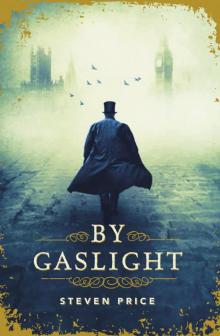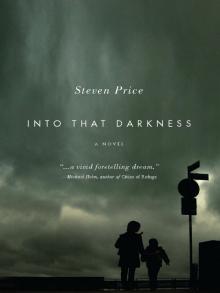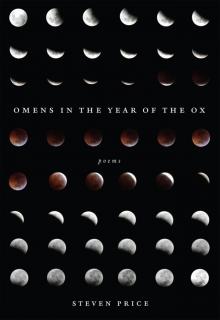- Home
- Steven Price
Omens in the Year of the Ox Page 2
Omens in the Year of the Ox Read online
Page 2
I watch his slack underskin shine.
It is not the flesh that first must fly.
When he stoops blacking the light,
bat-winged and magnificent,
how I fear for him, fear
he lacks the recklessness
this act will ask of us. All my life
I have lived in shadow knowing light
does not keep. Knowing
what falls to the son. All night
now each night I watch
the exquisite wax smoulder and weep.
The Wrecking
It falls. All week
the high whine, ping
of steel bolts screed
down to shearings,
shafts. That hotel
gutted to its eaves
leans, fenced-off out
a mud-straked street
where red dust blown
through rust-thick air
blooms, like fear;
it leans, a slow
huge whooshed insuck
of gust and crash—
then falls. All brick,
mortar, glass, ash.
Where the wet gashed
works groan, gape wide,
men wade the slash:
flexed girders grind
hard, arc-rolled steel
rods clang; and dust
being all, all
is dragged to dust.
Under that dark
and blood-slaked sun
dark smoke rises.
This world too will end.
Chorus
Two ghosted, I guess, in, goldening maybe
where the bells of gleaming pans wavered
in racks above the stove. I let them talk.
“He fears the surest work’s the least assured;
looks to the burning of the useless, at least
the burning off of it.” “That’s the ash of it.”
The kitchen cantled with, what, an ambered shine,
as if a candle burned in sunlight. Was that them?
“He trusts us.” “No; he trusts to a singing
which seduces; he sings his meaning.”
“But picks apart the clockwork to while away
the time. While none of it means a thing.”
And if, say, one trusted nothing, least of all
the singing? As the table’s grain coalesced
in a honeyed light, so little seemed
to matter. “How assured he sounds,” sighed one.
“Sure as faith,” agreed some aggrieved
second. I knew it wasn’t possible to live
in faith without living too in doubt. “Assured
again,” they whispered, “doubly so, and so
reassured.” At which I reached for a knife
and calmly began to carve the bread.
Danube Relic
As if its brown charred tip once tapped
hard this hauled-stone
cathedral’s crypt, once wanted out.
Seems a saint’s relic
scraped in soiled wrappers outweeps
even guarded glass:
see its slow molten dreep dap low.
So like wax creeping.
Was a girl’s once. And once curled
tangles of lace
from her living face what’s now all char
and tallow-grease,
black drip and blur burned centuries
past. Latched under glass
her shrivelled finger, survived of fire,
graces a gilt cord,
hangs hacked, weathered, grey-tethered and tied
like a twist of grass
left to dry. Papered like a wasps’ nest,
tarred nail tapered,
it’s said held hard her finger feels it yet—
half hook-and-wire,
all sawed-off strange, the hand of a girl burned
burns like fire.
Auto-da-Fé
Grace is like fire, says Augustine of Hippo, extending the metaphor: burning a man must be done with skill if he is to last. Most die with merely their calves on fire. I remember a dark swale of grass, a girl lifting her shirt. Folding back her cuffs to show her scars. Cigarette burns in small white lesions on her wrists. When burning a man, one must tether faggots and twists of straw up the stake to the head. In this way he will burn in stages and not be overwhelmed. She ran her fingers through her hair and her hair in the dusk was singed by the fire of that setting sun. As a toddler Augustine had played in the courtyard while his mother bathed, the bones glowing in her ankles. Augustine says in the sunlight the hands of our mothers burn like sunlight, like they aren’t there at all. It is never what we think. She rubbed her scars and said, Fire eats and eats in order not to die. I said, We are so alike you and I.
Bull Kelp
The weed is dark inside and wetbrained.
All night drifts down cold waters,
lolls like a child’s skull in the swells
then washes up here: unboned eelthing,
stiff searoot, tough resined tentacle
risen from what brackish dream.
Drained to sand-pocked rubber, dried
ochre, dried grey, its slack blades
splay from a shrivelled stalk
like the bent stump of some blunt propeller,
mangled in bladderwrack and reeking.
Embrangled, yes, rucked, yes, battered
by that bright element we too wake to,
come dawn dead kelp sprawls
cold with the nightcold and so stiff
its uncoiled mess, massed, won’t shift
at a kick. Now sandfleas blink like blown sparks out;
now hauled hard by the brunted head
its stipe, whip-sharp, hists a wet sigh
and the sun bells redly through its blades.
What a thing it is. Evidence perhaps.
Cast up thickening among us
to bleach here in a burning air, stretched
long, long, gleeched and ungulous
until it, this, stewed placenta, this puddled thing
poked with a stick or walked unwondering past
splits its slippery gutline, peels apart in rot—
and a knot of larvae boils in that dark and does not clot.
Arbutus
If grief were given shape, if grief
were given shape would it grow like this
in a horror of limbs, and headless—
Abruptly up to gripped rock it
gives, groan on ingrained
groan, it
writhes, waterworn and weathering
the weather of its own wood
while the shelf of the world shivers.
No bark
is born so old. No bark is born
with blunt teeth bared and tearing red strips of itself
in such thin streaping curls of skin, no bark
but this, crackling under the smooth gnarl
of its own flensing. Windlorn, windflinted,
still like slow molasses wound on a stick
it pours the thick thrust of itself
hugely upward, anguished, arboreal,
it seeks its brutal purchase, it sinks its rootmuscles in
and will not be moved, it will be
unmoved
as if grief as if grief as if
grief, engorged, grappled its roots below. No it has no
choice. It outstrips itself as it grows.
A Gloss on Arbutus
I stood under it, stunned.
Ropes of red hair in its rails.
Its leaves, sundialed, shone.
My skull rigged open like a sail.
I swung under it, stunned.
The world in its shook foil shone.
I was an eye and was not.
What I wanted was undone.
The unbeautiful was fraught.
I watched a punched branch spin.
My wrists, sundialed, shone.
&nbs
p; When I gasped a gust rushed in.
Then all was gloom, appalled bark, and my arms were swaying with wind.
Raccoon in Ditch
I
Where seed-foaming weeds drag darkly, dusk rises;
rises in a last crunch of sunlight off fenders flaring west—
you watch each tiny plicked claw stutter shut.
Asplayed, astunned, so unskinned it seems
but gleetslicked gut: innards peeled back like a glove
lately worn, warm yet. Blood-dazed, black ants swarm
like a hive of darkness. What you feel is love:
how all things that live have inner halls light knows nothing of.
How you are also of that dark.
II
Dragged from what black dream running, hurtled
to what weed-ditch. Grey fur bloodrubbed at its ribs
and, seamsplit, that slow blue bubble of gut.
A dead raccoon is dull and like any other
dead goes stiff in its own thingness. Sticks can’t shift it.
Wasps lift past it low in the pollen-stung air.
Less than that it seems. Unzippered, a purse of fur
poured from itself. Gorged fat on dayfire and grown
beyond all size. Scraped up, a bucket’s worth.
But lumbering thick-shanked, fur-thighed, once
its banded tail dragged fatly like a bull’s phallus;
at dusk would slouch through a clatter of cans
what sprawls now spoiling in groil and ooze, snout
fanged yet, lips flensed back, flecked fur frothing with ants—
what once could drown a hound thrice its weight.
What are they. Night-diggers, weasel-gods, furred moons:
seen afar, they peer at us with the green eyes of children;
come dusk their delicate hands could be human.
III
How you are also of that dark.
How all things that live have inner halls light knows nothing of,
like hives of darkness. What you feel is love
lately worn, warm with blood. Black ants swarm;
all gleetslicked gut, innards peeled back like a glove,
asplayed, astunned, and so unskinned it seems
you are not you. Tiny plicked claws stutter shut
in a crunch and flare of sunlight; fenders fade west;
and there, where seed-foaming weeds drag low, something
rises. There will be no other end to the world.
Chorus
I drove through furred fields veiled in rain
when road struck sea struck sky. Parked
brooding above the windscried chop
of a weedchoked beach, watched one
shudder through a shut vent in the dash.
“It’s dark in here,” it whispered, “dark
as pitch.” “Darker,” another hissed,
forming in the back. “Dark as meaning.”
“Dark as love.” Others were drifting in.
“The kelp down there’s dark inside
and wetbrained,” said one. I sat
outshivering the chill, jacket slack
and thin. You have nothing to say, I said,
your words are without meaning.
A silence; then muttering soft as felt.
“Who’s he speaking to?” “He’s alone.”
You believe in nothing, I added, as the wet
light warpled where I clutched the wheel.
Then the air stilled; they addressed me
directly. “It’s as you fear. Our voices are just
vowels jarred to clattering, errors
mucked with meaning. You know this
and knew this. The emptiness you fear
is speaking in you; what you hear
is the nothing that nothing announces.”
And then, to drive their point clear:
“You are not haunted. Nothing is in you.”
Reparations
Juliet onstage in Florence sheathing a blade in her breast. How she wept, in Italian, in black weather. That was the third night. All day we had crossed museum halls, our steps echoing from that famous statue’s broken embrace to a faded canvas baring Helen’s dagger of white thigh. It seems our greatest arguments for love are all arguments against it. The sun was going down and the pigeons were inking the cobblestones of the square. There was a child wearing an accordion. He sang, We do not remember a time before we were loved. Hearts, too, are tuned to a minor key and like other instruments hang mostly silent, collecting dust. I was born on a Thursday. On a Thursday six men carved a hole in my grandfather’s chest, removed and jarred and preserved his bad heart like bruised fruit. Remember always the heart is a made thing, the child sang. In the manner of music or fire, the crowds sang back. We are shaped by human hands and what loves us consumes us.
Bach’s Soprano
Feeds and feeds.
Eats air, ear, all: her white throat
thoraxing where waxed lamps flare;
where six thousand silver ears dial
in darkness dreamily towards her.
Soft faces stunned by such light.
No shame in sitting stunned
among the stunned, slumped in gloom.
That hall’s high ribbed shell gleams;
my difficult friend, I lean
along a low felt armrest and accept,
since it is real, my own failing
ambition on this earth. All is
emptied. She sings a vast engulfing intake
of air, wrenched and vocable,
when again the vortex takes her,
drains her. Feeds, feeds on a fading world.
That a thing so fragile persists,
that a thing so fragile is heard. You
watch the white shine of an ear in the dark
fade. We live and are diminished.
Orpheus Ascending
Blood-deep in black rock: a keyhole
blazing like the silver ear
of a god. A door. He staggered cold
and shaking through the cellar
of an old villa: racks of grimy bottles
straked in soot, char, ash; that grotto’s
dank air
stirred, flared
its dust like golden krill in his weird stare
where the black reek of brackish meat
hazed him yet. His lungs burned
with the dark sweetness of it, her,
the stink of wet soil and her
rot in his skin, harp, clothes. Dragged
back from daylight, her ragged
black hair
bruised there,
her grey sluckish flesh shuddering to air
ten steps shy of the world— Hell
in its green darkness was not hell;
here the cold villa of the real hell
flensed him, he shivered: hell
was sighting her soft shrivelled head
slick with a fungal rot, her bled
lips moist,
limbs poised,
swaying like the blind in the lantern of his voice
even as he turned. All of it, all
was a kind of rot, it ate the skin—
He straggled upstairs, through halls,
courtyards, into the weak sun
singing yet. Fearing what he’d wanted.
But, too: how lovely, how haunted
his voice
was, is—
when he felt her footsteps falter under his.
Hard yellow wasps in the weeds at his hips.
Dried grapes on stakes. Then the earth
shuddered under, shirred, his heart slipped
and his lips were smeared with dirt,
the thick black mulch churning there: it seemed
some evil thing in that earth was singing,
singing,
singing,
something evil in that earth was singing.
The Tun
nel
Now that we have cleared the last bricks, it is time. All month we laboured in a smoky lamplight, groping wearily while our brothers slept above us in their cells. The rafters creaking overhead as they stirred. And each dawn, called to matins, how we prayed silently for fortitude, for grace: Lord guide us now in this our late trace. See the cellar boards, peeled back with care, propped across the dusty casks: even their charred nails point us earthwards. Is it the devil’s work we do? This hole holds a thick and oily shadow even lampshine cannot cut. Kneeling before it, we sometimes smell leaf-mould, sometimes honey, sometimes only a cold wind that plucks at our sleeves.
Yesterday in chapel the chalice split in two.
Soon now we go through.
Midwife’s Curses
May your sons be born
grey, blood-slathered in thick sludge;
may they never cry.
___________
May you love only deeply
and never die.
___________
May blood glut your breasts—
may all you eat be dust in your mouth,
ash in the mouths of your kin.
___________
May your milk be a ribbon of darkness,
your lullabies a black wind.
___________

 By Gaslight
By Gaslight Into That Darkness
Into That Darkness Omens in the Year of the Ox
Omens in the Year of the Ox